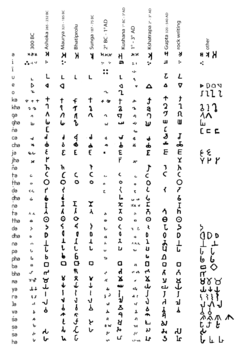Hindi: Difference between revisions
m (1 revision imported) |
(Add Etymology) |
||
| Line 43: | Line 43: | ||
Hindi Diwas is an annual celebration on 14th September. It commemorates the law of 1949 that made Hindi the legal language of the Republic. | Hindi Diwas is an annual celebration on 14th September. It commemorates the law of 1949 that made Hindi the legal language of the Republic. | ||
==Etymology== | |||
The term Hindī originally was used to refer to inhabitants of the [[Indo-Gangetic Plain]]. It was borrowed from Classical Persian هندی Hindī (Iranian Persian pronunciation: Hendi), meaning "of or belonging to Hind (India)" (hence, "Indian").<ref>http://dsalsrv02.uchicago.edu/cgi-bin/philologic/getobject.pl?c.7:1:6823.steingass</ref> | |||
Another name Hindavī (हिन्दवी) or Hinduī (हिन्दुई) (from Persian: هندوی "of or belonging to the Hindu/Indian people") was often used in the past, for example by Amir Khusrow in his poetry.<ref>https://books.google.co.in/books?id=yexgmTQIYhUC&redir_esc=y</ref> | |||
The terms "Hindi" and "Hindu" trace back to Old Persian which derived these names from the [[Sanskrit]] name Sindhu (सिन्धु ), referring to the river Indus. The Greek cognates of the same terms are "Indus" (for the river) and "India" (for the land of the river).<ref>https://books.google.co.in/books?id=6gyAAgAAQBAJ&pg=PA1&redir_esc=y#v=onepage&q&f=false</ref> <ref>https://www.etymonline.com/word/india</ref> | |||
==References== | ==References== | ||
Revision as of 18:36, 26 March 2021
| Hindi | |
|---|---|
| हिन्दी | |
 The word "Hindi" in Devanagari script | |
| Pronunciation | /maːn̪ək ɦin̪d̪iː/ |
| Native to | India Significant communities in Nepal |
Native speakers | (180 million[1] cited 1991) Total, including Urdu: 490 million[2] |
Indo-European
| |
| Devanagari Hindi Braille | |
| Official status | |
Official language in | |
| Regulated by | Central Hindi Directorate (India)[4] |
| Language codes | |
| ISO 639-1 | hi |
| ISO 639-2 | hin |
| ISO 639-3 | hin |
hin-hin | |
| Linguasphere | 59-AAF-qf |
Hindi is an Indo-Aryan language. It is the main language in India. about 800 million people speak hindi in India. The Devanāgarī script is used to write Hindi. Previously Hindi was known as Hindui.
Hindi is widely written, spoken and understood in North India and some other places in India. In 1997, a survey found that 45% of Indians can speak Hindi. It has taken words from the Dravidian languages of South India, as well as the Arabic, Persian, Chagatai, English and Portuguese languages.[citation needed]
Hindi and Urdu were considered the same language but have evolved into separate dialects. However, to this day, both languages are mutually intelligible, meaning their speakers can understand each other without knowing the other language. Urdu, however, is written in the completely different Arabic alphabet.
Hindi developed from Sanskrit, the ancient language of India. Hindi started to develop in the 7th century as "Apabhramsha" and became stable by the 10th century. Some famous Hindi poets are Tulsidas and Kabir.
Dialects of Hindi include: Avadhi, Braj, Bhojpuri, Bundeli, Bagheli, Chhattisgarhi, Dogri and Marwari.
Hindi is also spoken with regional accents like Haryanvi and Rajasthani. Bombay Hindi is spreading because Bollywood films use it.
Hindi Diwas is an annual celebration on 14th September. It commemorates the law of 1949 that made Hindi the legal language of the Republic.
Etymology
The term Hindī originally was used to refer to inhabitants of the Indo-Gangetic Plain. It was borrowed from Classical Persian هندی Hindī (Iranian Persian pronunciation: Hendi), meaning "of or belonging to Hind (India)" (hence, "Indian").[5]
Another name Hindavī (हिन्दवी) or Hinduī (हिन्दुई) (from Persian: هندوی "of or belonging to the Hindu/Indian people") was often used in the past, for example by Amir Khusrow in his poetry.[6]
The terms "Hindi" and "Hindu" trace back to Old Persian which derived these names from the Sanskrit name Sindhu (सिन्धु ), referring to the river Indus. The Greek cognates of the same terms are "Indus" (for the river) and "India" (for the land of the river).[7] [8]
References
- ↑ Ethnologue, "Hindi"
- ↑ BBC: A Guide to Urdu
- ↑ Hindustani (2005). Keith Brown (ed.). Encyclopedia of Language and Linguistics (2 ed.). Elsevier. ISBN 0-08-044299-4.
- ↑ Central Hindi Directorate regulates the use of Devanagari script and Hindi spelling in India. Source: Central Hindi Directorate: Introduction Archived 2010-04-15 at the Wayback Machine
- ↑ http://dsalsrv02.uchicago.edu/cgi-bin/philologic/getobject.pl?c.7:1:6823.steingass
- ↑ https://books.google.co.in/books?id=yexgmTQIYhUC&redir_esc=y
- ↑ https://books.google.co.in/books?id=6gyAAgAAQBAJ&pg=PA1&redir_esc=y#v=onepage&q&f=false
- ↑ https://www.etymonline.com/word/india


